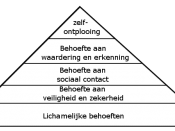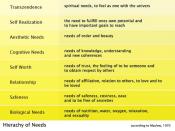Content theories assume that all individuals possess the same set of needs. These theories tend to be heavily prescriptive in nature, since by assuming people have similar needs they are also recommending the characteristics that ought to be present in jobs.
Although content theories are based on the assumption that we can attribute a similar set of needs to all individuals, theories within this category differ in their accounts of what these needs are. Maslow (1954) outlined what is perhaps the most influential of the content theories. According to A. H. Maslow, human needs become reasonably well satisfied, a person places more emphasis on the secondary needs. He suggested there is a hierarchy of needs up which people progress. Maslow separated the five needs into higher and lower orders. Physiological and safety needs were described as lower-order needs. The two orders were differentiated on the premise that higher-order needs are satisfied internally, whereas lower-order needs are predominantly satisfied externally (by things such as wages, union contracts, and tenure).
Once individuals satisfy a need at one level in the hierarchy, it ceases to motivate their behaviour; instead they are motivated by the need at the next level up the hierarchy. Thus, at first individuals are motivated by physiological needs such as hunger and thirst. If conditions are such that these needs can be satisfied, security needs such as the need for shelter and protection become the major influence on an individual's behaviour. A favourable environment allows an individual to progress from behaviour activated by these deficiency needs to behaviour which reflects what Maslow termed higher-order needs.
This progression ultimately leads to behaviour motivated principally by the need to realize one's full potential, which Maslow termed the need for self-actualisation. Maslow, however, believed that because of the uneven distribution of...


